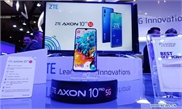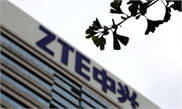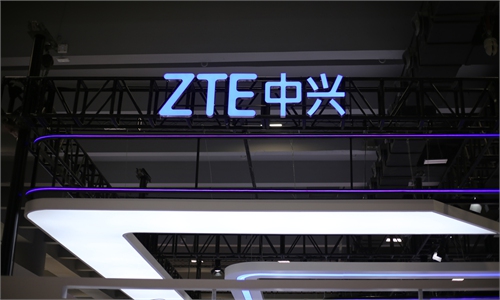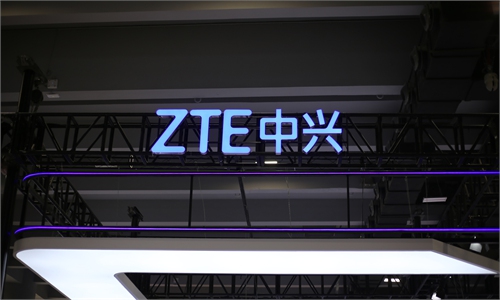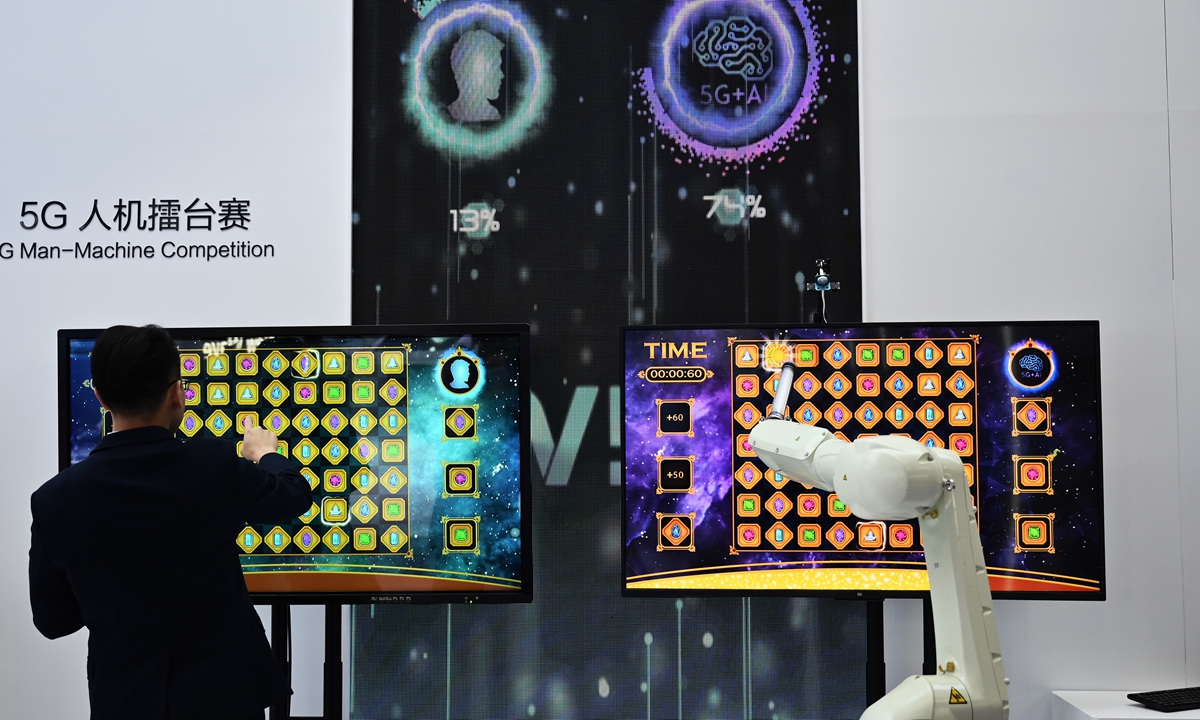
The ICT ecosystem's leading event, PT Expo China, hosted by the Ministry of Industry and Information Technology, opens on Wednesday in Beijing. Here, a man is seen competing with a 5G robot during a game at ZTE's booth. Photo: cnsphoto
After a lengthy wrangle with Washington over alleged illegal exports to Iran and North Korea, Chinese telecom giant ZTE on Wednesday said it received a verdict from a US court to end its five-year probation, during which time the US launched a series of premeditated actions against China including a trade war and similar trade bans on other Chinese tech firms.
While hailing the verdict as a piece of good news and a helpful result for the tech giant by abating external auditing, analysts also said that the lawsuit offers a lesson for domestic tech companies like Huawei, inspiring them on the need to play hardball amid a US crackdown and seek technological independence from US containment.
A ZTE statement on Wednesday said the verdict it received from a US court confirmed that the court decided "not to revoke" ZTE's probation, meaning that the probation ended on Tuesday according to past rulings. It also noted that no penalties were added along with the decision.
ZTE expressed confidence in the efficient operation and continued improvement of the company's compliance management system, saying it will insist making compliance the "cornerstone" of its future development and the "bottom line" for future business operations.
The tech giant had pleaded guilty in 2017 to shipping equipment to Iran and North Korea in violation of US rules and agreed to pay a $1.2 billion fine. It paid an additional fine of about $1 billion, replaced its senior executives and agreed to be scrutinized by US appointed monitors.
News of the verdict led to ZTE's shares hitting their trading limit almost immediately after the company's shares resumed trading Wednesday afternoon on the Shenzhen stock market. ZTE had suspended trading of its shares Wednesday morning.
"It's like light at the end of the tunnel," says Pan Helin, a research fellow at the International Business School of Zhejiang University. "It not only means a reduction of management fees for ZTE, but may also mean removal of other types of restrictions as well."
Experts also noted ZTE's handling of the crisis reminds people of Chinese tech companies' resilience and abilities to resist crackdown, as their business was not weighed down by US sanctions, but instead developed even better.
"In 2017, many Chinese were shocked when they learned about the incident, an earthquake in bilateral ties, and feared that more Chinese tech companies would be slaughtered soon by the US, but it did not happen and Chinese people's perception of the US and bilateral ties has turned more confident in the past years," Lü Xiang, a research fellow at the Chinese Academy of Social Sciences, told the Global Times.
Last year, ZTE achieved a 12.9 percent growth in sales, while its net profits surged by 59.9 percent to reach a record 6.81 billion yuan.
Changes in five years
Looking back at ZTE's legal case in the US, which kicked off the US' years-long crackdown on Chinese companies, analysts felt an evolving trend on the part of China to grow increasingly well-prepared, calm and unyielding in handling unfair US treatment, whether in terms of a company response or public opinion.
"At the beginning, Chinese tech companies didn't have a thorough understanding of the US' long-arm jurisdiction measures, nor did they arm themselves with legal weapons or carry out enough scientific innovation to offset US containment. ZTE just paid the fines and admitted mistakes," Huo Zhengxin, a law professor at the China University of Political Science and Law, told the Global Times on Wednesday.
However, as such sanctions became increasingly frequent in the name of legal supervision, Chinese tech companies have realized the hegemony behind those actions, and are beginning to tackle such crackdown measures head-on, a very gratifying change spurred by those companies' own efforts as well as support from government, experts said.
A typical example is Huawei, which didn't admit guilt when facing similar exports accusations from the US, but instead fought the US crackdown with legal means, including filing lawsuits against 16 US government departments. Some believe the company won over the US government after its chief financial officer Meng Wanzhou returned back to China in 2021.
Similarly, video-sharing application TikTok owned by Chinese tech giant ByteDance also sued the US government in 2020, challenging a Trump administration ban.
Experts said that the changes in Chinese companies' actions have been rooted in broader changes in the country's legal system and public opinion, as Chinese public's viewpoints about the US are growing increasingly confident and detached.
"In the past five years, Chinese people have seen US become increasingly unsafe and unconfident when China grew on par with the US. Chinese people now view the US from an equal position," Huo said.
Lü said that Chinese people clearly saw the US' irresponsible and hegemonic behavior, especially since the pandemic started in 2020, and we noticed a change among the Chinese public which was that there were less pro-US people, although it did not necessarily indicate an increase in the number of people who hate the US.
"Chinese people are getting more confident in their own path, and the US is becoming less and less important in the eyes of the Chinese," he said.
On the other hand, China's legal system is also maturing in terms of launching countermeasures against US crackdown. In 2021, China formally passed the Anti-Foreign Sanctions Law, which allows China to take countermeasures against foreign individuals and entities involved in discriminatory measures. China's commerce department also released an unreliable entity list in 2020, which is believed to be a response to the US entity list.
Independent changes
Experts cautioned that although ZTE's legal dispute was temporarily settled, it does not mean an end to the company's troubles in the US or to the US' general policy direction of sanctioning Chinese companies.
"It's likely that the Biden administration would intensify its crackdown on Chinese high-tech companies, especially in the semiconductor industry with its Indo-Pacific strategy," Lü said, noting that Biden attempted to build a "closed global semiconductor industry" with Japan, South Korea and Taiwan island under the strategy, although it was difficult to achieve.
The US government in 2018 also placed a ban on ZTE to buy sensitive components and software from American companies for seven years. The ban was never totally revoked.
According to analysts, a hard-learned lesson from the ZTE incident is that China must speed up building its "internal strength," which means independent research and development.
A source in China's semiconductor industry surnamed Zhao told the Global Times that in recent years, China has enhanced independent research in the semiconductors sector across the whole industry chain.
"From hardware like chip production machines to software, China's semiconductor industry is seeking localization," Zhao said, adding that the company he works in is also getting more and more orders from domestic clients.
Lü also told the Global Times he believes that the Chinese high-tech sector could realize self-sufficiency in three or four years, and at that time the Chinese high-tech sector's development will not be hampered even if the US launches a large scale economic blockade against China.


